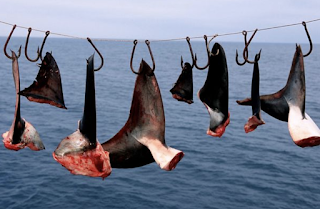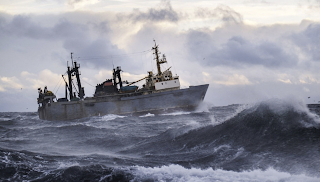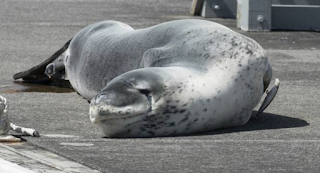Shark fin wins the house, Abalone comeback, Sustainable brands, Right whale protection, Lawless oceans and overfishing, Bacteria from ocean floor influencing Arctic weather and more…
November 20, 2019, The U.S. House passed the Shark Fin Sales Elimination Act, H.R. 737, led by U.S. Reps. Gregorio Sablan (D-NMI) and Michael McCaul (R-TX), to prohibit the import, export, possession, trade, and distribution of shark fins or products containing shark fins.
U.S. Senators Cory Booker (D-NJ) and Shelly Moore Capito (R-WV) also introduced a companion bill. For this to become law, we need the Senate to pass the bill and then we will need the President’s signature.
Editorial Comment: If you are a US citizen, please use our convenient tool to tell your senator to vote “yes” on this bill.
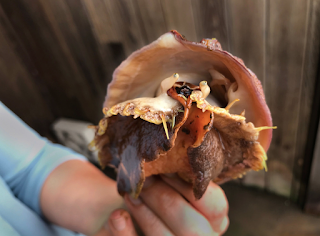 Hunched over a tank inside the Bodega Marine Laboratory, alongside bubbling vats of seaweed and greenhouses filled with algae, Kristin Aquilino coaxed a baby white abalone onto her hand. She held out the endangered sea snail — no larger than a bottle cap — like a delicate jewel. After years of fretting over their health, cleaning tanks and filtering the saltwater just right, one tiny oops could undo it all. “They’re like human hemophiliacs,” Aquilino said, using a plastic ruler to measure the stubborn gastropod as it twisted and squirmed. “Even a small cut, they can bleed to death.”
Hunched over a tank inside the Bodega Marine Laboratory, alongside bubbling vats of seaweed and greenhouses filled with algae, Kristin Aquilino coaxed a baby white abalone onto her hand. She held out the endangered sea snail — no larger than a bottle cap — like a delicate jewel. After years of fretting over their health, cleaning tanks and filtering the saltwater just right, one tiny oops could undo it all. “They’re like human hemophiliacs,” Aquilino said, using a plastic ruler to measure the stubborn gastropod as it twisted and squirmed. “Even a small cut, they can bleed to death.”
 Along with the climate crisis, our destructive food system and other complex, systemic issues facing threatening our longevity on this planet, the health and sustainability of the ocean and everything it provides has become top of mind in recent years — thanks to growing corporate and governmental mobilization around rescuing this precious resource from our historically exploitative relationship to it.
Along with the climate crisis, our destructive food system and other complex, systemic issues facing threatening our longevity on this planet, the health and sustainability of the ocean and everything it provides has become top of mind in recent years — thanks to growing corporate and governmental mobilization around rescuing this precious resource from our historically exploitative relationship to it.Editorial Comment: If private industry takes responsibility for their role and leverages the ingenuity of the free market to find solutions, it could be a game-changer.
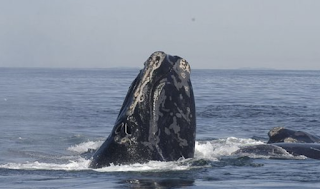 The U.S. Senate Committee on Commerce, Science, and Transportation held a markup on S. 2453, the Scientific Assistance for Very Endangered (SAVE) Right Whales Act led by U.S. Senators Tom Carper (D-DE), Cory Booker (D-NJ), Johnny Isakson (R-GA). The measure would protect the North Atlantic right whale, one of the most endangered species of whales, by establishing a grant program to promote collaboration between states, nongovernmental organizations, and members of the fishing and shipping industries to reduce human impacts on right whales and promote the recovery of the population.
The U.S. Senate Committee on Commerce, Science, and Transportation held a markup on S. 2453, the Scientific Assistance for Very Endangered (SAVE) Right Whales Act led by U.S. Senators Tom Carper (D-DE), Cory Booker (D-NJ), Johnny Isakson (R-GA). The measure would protect the North Atlantic right whale, one of the most endangered species of whales, by establishing a grant program to promote collaboration between states, nongovernmental organizations, and members of the fishing and shipping industries to reduce human impacts on right whales and promote the recovery of the population.
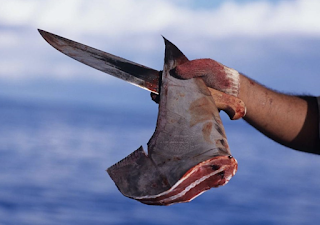 As of December 1, 2019, a total ban will be placed on parrotfish harvesting and any attempt to pursue shark fin fishing will also be illegal in St. Vincent and the Grenadines. Saboto Caesar, the island’s Minister of Fisheries, commended stakeholders for their support and encouragement in protecting the island’s biodiversity. “This year we celebrate, as leaders in conservation globally, our achievements in protecting turtles, preventing the illegal trade of the Union Island Gecko, and soon a ban on harvesting of the parrotfish and on shark fin fishing.
As of December 1, 2019, a total ban will be placed on parrotfish harvesting and any attempt to pursue shark fin fishing will also be illegal in St. Vincent and the Grenadines. Saboto Caesar, the island’s Minister of Fisheries, commended stakeholders for their support and encouragement in protecting the island’s biodiversity. “This year we celebrate, as leaders in conservation globally, our achievements in protecting turtles, preventing the illegal trade of the Union Island Gecko, and soon a ban on harvesting of the parrotfish and on shark fin fishing.
There are few remaining frontiers on our planet. But perhaps the wildest, and least understood are the world’s oceans: Too big to police and under no clear international authority, these immense regions of treacherous water play host to rampant criminality and exploitation of the marine life below the surface and the humans working the boats above it. Consider the perils facing the tens of millions of people working aboard one of thousands of illegal fishing vessels on the high seas. At least one ship globally sinks every three days.
 Italy is to become the first country to make climate change lessons compulsory in schools, Education Minister Lorenzo Fioramonti announced. When children return to class in September 2020 after their summer holidays, their annual curriculum will also include 33 hours — approximately one per school week — dedicated to climate change and sustainable development.
Italy is to become the first country to make climate change lessons compulsory in schools, Education Minister Lorenzo Fioramonti announced. When children return to class in September 2020 after their summer holidays, their annual curriculum will also include 33 hours — approximately one per school week — dedicated to climate change and sustainable development.
8. Bacteria from the ocean floor could be influencing Arctic weather
 Scientists have identified a surprising new mechanism that could be affecting cloud formation and weather patterns in the Arctic: bacteria from the ocean floor. When tiny, plantlike ocean microbes known as phytoplankton die, their bodies sink to the bottom of the sea, becoming food for bacteria residing there. New observations made in the Bering and Chukchi seas off the coast of Alaska suggest that under the right conditions, these algae eaters are sloshed to the surface and from there are wafted into the air.
Scientists have identified a surprising new mechanism that could be affecting cloud formation and weather patterns in the Arctic: bacteria from the ocean floor. When tiny, plantlike ocean microbes known as phytoplankton die, their bodies sink to the bottom of the sea, becoming food for bacteria residing there. New observations made in the Bering and Chukchi seas off the coast of Alaska suggest that under the right conditions, these algae eaters are sloshed to the surface and from there are wafted into the air.
9. Ocean could provide over six times more food than it does today
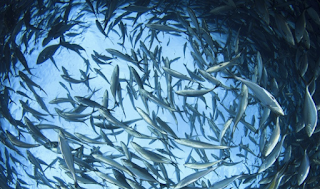 The ocean could provide over six times more food than it does now with better management and more technological innovation, scientists said on Tuesday, adding that boosting cultivation of bivalves like mussels and clams could be especially beneficial. They estimated the oceans could provide more than two-thirds of the animal protein that U.N. food experts predict will be needed to feed the world in the future. Fish currently account for about a fifth of animal protein consumed by humans.
The ocean could provide over six times more food than it does now with better management and more technological innovation, scientists said on Tuesday, adding that boosting cultivation of bivalves like mussels and clams could be especially beneficial. They estimated the oceans could provide more than two-thirds of the animal protein that U.N. food experts predict will be needed to feed the world in the future. Fish currently account for about a fifth of animal protein consumed by humans.
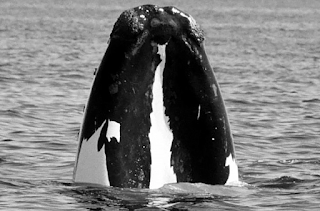 Marc Palombo has been fishing lobster for 41 years, and he wants fishermen who come after him to be able to do the same. That’s why he’s testing a new type of fishing gear that, along with other efforts in New England and Canada, is being designed to avoid harming North Atlantic right whales. The number of North Atlantic right whales, one of the world’s most endangered large whale species, has declined from about 500 in 2010 to about 400 in 2019. This year, about 10 have been found dead, but that number is uncertain.
Marc Palombo has been fishing lobster for 41 years, and he wants fishermen who come after him to be able to do the same. That’s why he’s testing a new type of fishing gear that, along with other efforts in New England and Canada, is being designed to avoid harming North Atlantic right whales. The number of North Atlantic right whales, one of the world’s most endangered large whale species, has declined from about 500 in 2010 to about 400 in 2019. This year, about 10 have been found dead, but that number is uncertain.
 Global heating is “supercharging” an increasingly dangerous climate mechanism in the Indian Ocean that has played a role in disasters this year including bushfires in Australia and floods in Africa. Scientists and humanitarian officials say this year’s record Indian Ocean dipole, as the phenomenon is known, threatens to reappear more regularly and in a more extreme form as sea surface temperatures rise.
Global heating is “supercharging” an increasingly dangerous climate mechanism in the Indian Ocean that has played a role in disasters this year including bushfires in Australia and floods in Africa. Scientists and humanitarian officials say this year’s record Indian Ocean dipole, as the phenomenon is known, threatens to reappear more regularly and in a more extreme form as sea surface temperatures rise.
12. ‘Giant floating solar farms could make fuel and help solve the climate crisis
 Millions of solar panels clustered together to form an island could convert carbon dioxide in seawater into methanol, which can fuel airplanes and trucks, according to new research from Norway and Switzerland and published in the Proceedings of the National Academy of Sciences journal, PNAS, as NBC News reported. The floating islands could drastically reduce greenhouse gas emissions and dependence on fossil fuels.
Millions of solar panels clustered together to form an island could convert carbon dioxide in seawater into methanol, which can fuel airplanes and trucks, according to new research from Norway and Switzerland and published in the Proceedings of the National Academy of Sciences journal, PNAS, as NBC News reported. The floating islands could drastically reduce greenhouse gas emissions and dependence on fossil fuels.
Editorial Comment: The success of this model relies heavily upon its resilience in heavy seas, or a plan to modify structure during storms.
13. Microplastics found in oysters, clams on Oregon coast
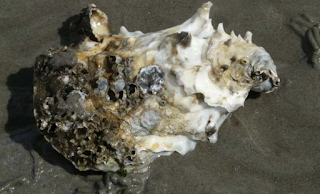 Tiny threads of plastics are showing up in Pacific oysters and razor clams along the Oregon coast—and the yoga pants, fleece jackets, and sweat-wicking clothing that Pacific Northwesterners love to wear are a source of that pollution, according to a new Portland State University study. Britta Baechler, a Ph.D. student in PSU’s Earth, Environment and Society program, and Elise Granek, a professor of environmental science and management, looked at what variables predict microplastic concentrations in Pacific oysters and razor clams—organisms that have commercial, recreational and cultural importance in Oregon.
Tiny threads of plastics are showing up in Pacific oysters and razor clams along the Oregon coast—and the yoga pants, fleece jackets, and sweat-wicking clothing that Pacific Northwesterners love to wear are a source of that pollution, according to a new Portland State University study. Britta Baechler, a Ph.D. student in PSU’s Earth, Environment and Society program, and Elise Granek, a professor of environmental science and management, looked at what variables predict microplastic concentrations in Pacific oysters and razor clams—organisms that have commercial, recreational and cultural importance in Oregon.
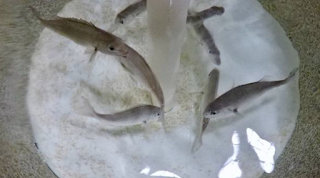 Scientists are learning about how broken down plastics affect fish – by feeding it to them. Microplastics, one of the world’s most pervasive pollutants, have now been found in the planet’s most pristine ocean waters – and even rainwater. But there’s much that scientists still have to understand about the microscopic scourge – especially its impacts on our health and that of marine species.
Scientists are learning about how broken down plastics affect fish – by feeding it to them. Microplastics, one of the world’s most pervasive pollutants, have now been found in the planet’s most pristine ocean waters – and even rainwater. But there’s much that scientists still have to understand about the microscopic scourge – especially its impacts on our health and that of marine species.
Editorial comment: Are the fish eating the plastic and incorporating the microplastics into their tissue, or does their digestive system break down the plastic?
A marine biologist says we need to learn to live with wildlife better as the search continues for who shot Owha, Auckland’s resident leopard seal. The celebrity seal, who measures over 3m in length and weighs about 400kg, was spotted bleeding from her face at the weekend from a suspected bullet wound. Marine conservation society Sea Shepherd this week put up a $5000 reward for any evidence leading to the conviction of the person or people responsible.
Editorial Comment: This has been happening globally for years. In Monterey, it is somewhat common to see sea lions missing lower jaws. They will eventually starve to death. Fishermen do not lie the fact that pinnipeds jump into their nets and feast on the catch as they haul in. They toss the sea li0ons small cherry bombs that resemble balls, the sea lion chomps down as they try to play and it explodes.
Sea Save Foundation is committed to raising awareness of marine conservation. The Ocean Week in Review is a team effort produced by the Sea Save staff to provide a weekly summary of the latest in marine research, policy, and news

